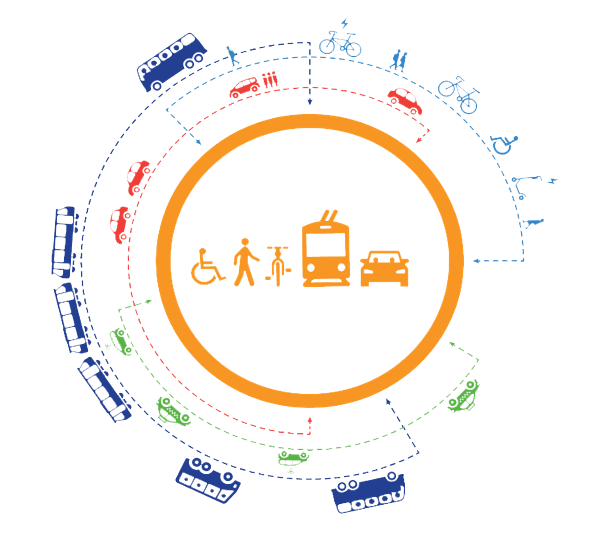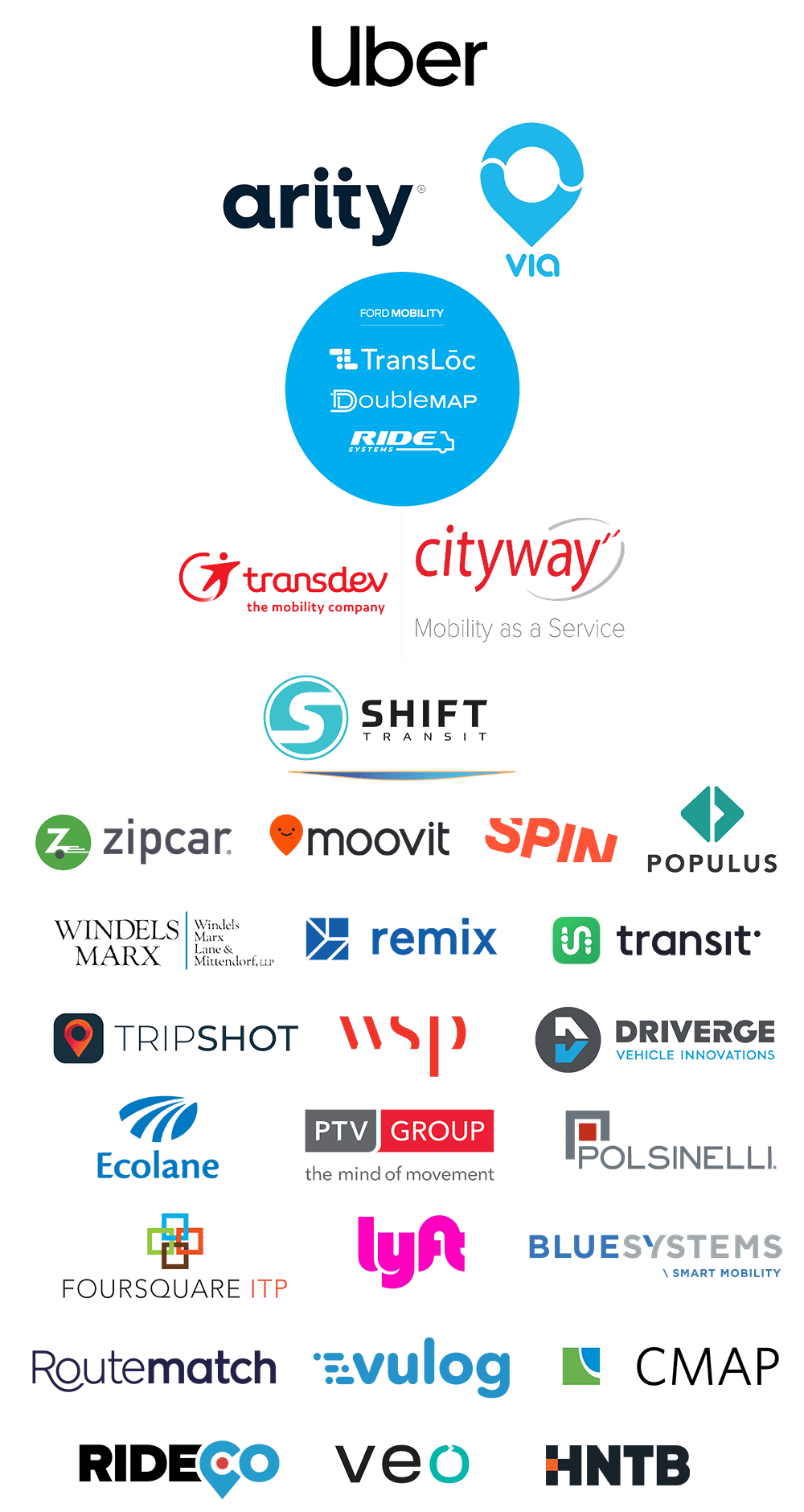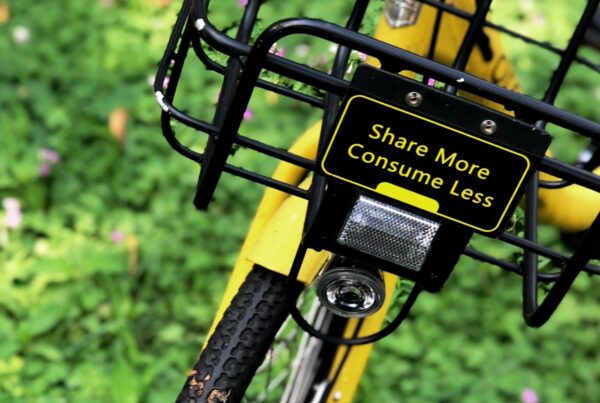Welcome to the Shared-Use Mobility Center’s weekly guide to the most impactful news, thought-provoking articles and innovative technologies that are shaping our transportation future. We believe in sharing information, just like sharing cars, bikes, and scooters, so if there’s anything additional you’d like to see, just drop us a line.
Announcements
Shared Mobility Summit in the News
Speaker Insight on Transit and COVID-19 Featured in Government Technology Magazine
Government Technology Staff Writer Skip Descant reports on how last week’s Shared Mobility Summit honed in on the impact the COVID-19 pandemic is having on transit, ridehailing, and micromobility. Citing multiple plenary panelists, the article predicts that more flexible routes, increased sanitation measures, and improved relationships with mobility providers will be lasting strategies as cities gradually reopen.
Read the article.
In this second article, Descant gleans further perspective from Jeff Tumlin, Executive Director of the San Francisco Municipal Transportation Agency and also a plenary speaker on the State of Shared Mobility: Strategies moving forward from COVID-19 panel on how transit can better act for the public good.
Free Virtual Panel and Workshop
Human Services Transportation:
Making Mobility as a Service Universal
Thursday, June 4 | 1:00 pm – 3:00 pm CDT

 Join us for a free workshop to discuss Human Services Transportation and Universal Mobility.
Join us for a free workshop to discuss Human Services Transportation and Universal Mobility.
Date: Thursday, June 4th
Time: 11:00 – 1:00 PT / 12:00 – 2:00 MT / 1:00 – 3:00 CT / 2:00 – 4:00 ET
This panel discussion will look at opportunities for data integration around human service transportation and larger Mobility Management and Mobility as a Service (MaaS) initiatives. From policy to practice, experts in the field will discuss the needs, opportunities, and strategies for creating an integrated mobility system that connects human service transportation to public transit. Following the plenary discussion, attendees will have the opportunity to discuss policy strategies that could be adopted at either a city, state, or federal level to encourage data sharing and integration across public and private sectors. Please email [email protected] with any questions.
Panelists Include:

NEW on the MOD Learning Center: Learn about Pop-Up Mobility Paths & Open Streets due to COVID-19 Crisis in this case study.
Ridehailing/Carsharing/Carpooling
Ridehailing company Via has temporarily suspended its operations in Chicago as mobility companies grapple with the massive decrease in rides from the ongoing pandemic.
Slowly but surely, more people are hailing Lyft rides in the US as a few cities begin to reopen and social-distancing measures are eased.
Another one bites the dust as GM shuts down its carsharing service, Maven, after 4 years, leaving one fewer service to compete with Zipcar and P2P platforms like Getaround and Turo.
Partnerships and Programs
The UK has announced a £2 billion plan to fast-track cycling and walking infrastructure to promote physical distancing (and active transportation) after the pandemic lockdown.
After almost three years of community meetings, civic development, and hot contention, Sidewalk Labs is shutting down its Quayside smart cities project in Toronto due to “economic uncertainty”.
Chicago-based firm Hammersley Architecture has drafted up a Chicago Promenade Plan “to be a catalyst for conversation and feedback from a design perspective” for opening up street space for walking and biking.
Hyundai and autonomous tech startup Aptiv are sending out self-driving cars in Las Vegas to help deliver meals to communities in need through the county’s Delivering with Dignity program.
Bikesharing and Micromobility
Uber is leading a large $170 million investment round in micromobility company Lime and transferring its JUMP mobility brand to the company to better integrate their shared bike and scooter operations.
As European cities prepare to relax lockdown policies and reopen busy districts, cities like Paris are leading the charge to ensure that biking and walking space is prioritized over vehicle traffic to keep social distancing in effect while keeping emissions and congestion to a minimum.
With transit facing immense constraints in cities like New York (and many others), people are losing a critical backbone in transportation. Dockless scooters could be an undersung component to keep mobility networks moving and safely replace car trips.
The University of Tennessee, Knoxville and Portland State University are collaborating on a new project to study how micromobility services like bikesharing and shared scooters can fill the transportation void in cities and help workers get to essential jobs during the COVID-19 outbreak.
Transit
Heads of the New York MTA, New Jersey Transit, San Francisco BART, Pennsylvania’s SEPTA, and Atlanta’s MARTA have called on the federal government to include $33 billion in funding for public transit in the next COVID-19 aid bill. We hope so.
The MBTA has approved a $159 million contract to connect southeastern Massachusetts and Boston through the South Coast Rail project for better commuter transit options throughout the state.
Staying safe while riding transit or just getting around in your community is paramount while weathering the COVID-19 crisis but healthy habits in mobility are bound to stick around (as Business Insider suggests) even when pandemic measures wind down in the future.
Transdev and Baltimore MTA have partnered to provide essential support through shuttle rides for hospital workers to and from the Greater Baltimore Medical Center.
Technology
Learn about Ford’s rapidly growing autonomous vehicle development and how Argo AI and its CEO Bryan Salesky are helping the company push the envelope in making self-driving cars a reality on WIRED.
The new GBFS v2.0 data standards for shared bikes and scooters are here with deeper integration into third-party apps, streamlined analytics and spec clarifications, and a large emphasis on consumer data privacy. Read about the new standards on Medium.
Self-driving tech company Waymo has started to resume limited autonomous vehicle testing in Phoenix (with no riders) as part of a “tiered approach” after halting operations earlier this year due to COVID-19.
The “gold rush” moment of autonomous tech that filled headlines in the transportation industry just a few years ago gave way to a burst of new mobility startups in the scene that dazzled investors and gained notable support from large automakers around the world. Now as harsher realities set in on the projected course of self-driving cars, these companies are starting to accept the challenges that come with the hype.
Urban Sustainability
The current pandemic has led to the slow streets and open streets movements in cities across the country, but such initiatives are futile if our public spaces are not safe for all members of the public. The tragic killing of Ahmaud Arbery, the 25-year-old African American male who was gunned down while jogging, underscores just how far we have to go. For “Black and Brown people to feel completely safe walking, biking, or just existing in public space”, this Streetsblog Chicago article states, “we need to make fundamental changes in the way our society is structured.”
Seattle Mayor Jenny Durkan announced that about 20 miles of the city’s streets will be permanently closed to vehicle traffic to allow for safer walking and biking even after the stay-at-home order is lifted. New York City, meanwhile, is opening up two more miles of streets to pedestrians and cyclists in Manhattan, Brooklyn, Queens, and the Bronx.
While the pandemic may have brought to light the failings in current transit networks in handling outbreaks, that doesn’t mean driving solo is the solution. National Geographic breaks down how resiliency plans to restructure our transportation systems can help fight COVID-19 and how walkable, dense communities still reign supreme on creating healthy and sustainable cities.
Cycling is booming in the US as a transportation option because of social distancing regulations and coronavirus concerns. Read how families, children, and those who weren’t avid cyclists before (including essential workers) are using bikes more than ever to get around their cities.
Requests for Proposals, Inquiries, and Information
Clean Mobility Options Now Accepting Applications
California’s Clean Mobility Options Voucher Pilot Program is accepting applications for Community Transportation Needs Assessment (Needs Assessment) Vouchers starting June 1, 2020. Needs Assessments Vouchers (~$50K) help evaluate community mobility needs and may be used to prepare for a future Mobility Project Voucher application (~$1M; application opening Fall 2020). Eligible applicants include CA nonprofits, agencies, and tribal communities. Learn more and start your application here.
RFP: Proponents for the Maryland Parkway Bus Rapid Transit
Regional Transportation Commission of Southern Nevada
Las Vegas, Nevada
Deadline: June 9, 2020
RFP: Request for Proposals for Paratransit Services
Green Mountain Transit Authority
St. Albans, VT
Deadline: June 17, 2020
Email Matt Kimball for RFP at [email protected]
RFI: Transit Technology Assistance
Oregon Department of Transportation
Salem, Oregon
Deadline: July 1, 2020
We’d like to thank the following sponsors for their support of the 2020 National Shared Mobility Summit.
 Did someone forward this to you? You can sign up for our newsletter here.
Did someone forward this to you? You can sign up for our newsletter here.



